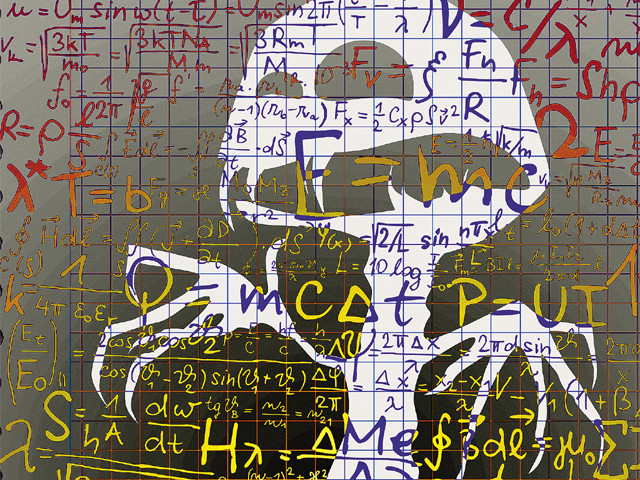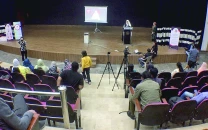Boo! It’s math!
Once guilty of some of most unforgivable mathematical crimes, BODMAS rule did come across as BAD MOSS for this writer.

To Miss Sadia’s relief, a few hands shoot up, ‘seven on ten,’ cry out Saad and Tania in unison. The remaining math period goes by in confusion, detest and occasional napping for the rest of the fifth graders.
These fifth graders amply represent the general approach to mathematics that pervades through a mostly non-mathematical, non-scientific society. Seven on ten may be the right answer to Miss Sadia’s question; however, it remains a dream ratio for ‘math-a-holics’ at this point.
So why do children hate math anyway? Just as “Why did the chicken cross the road?” or “what came first, the egg or the hen?” this question too remains unanswered.
O-Level student Bakhtawar says, “I don’t like math because it’s just plain tough.” Her friends Hani and Zarmeen agree. “No matter how many steps you get right, a single mistake and there you go — wrong answer!” While another class fellow Batool goes by the pretext that numbers hate her, Kanza who is toiling her way through Advanced Math believes “Math teachers are almost always very strict and make the subject seem that way too.”
Once guilty of some of the most unforgivable mathematical crimes, BODMAS (Brackets Order Division Multiply Add Subtract) rule did come across as BAD MOSS for this writer as well.
On the flip side, the math teachers tell a different story. For Miss Sadia, the distinction is easy to make as “the students who really want to learn something, pay attention and the rest are just not interested.” Shumaila Fakhar, a teacher at an intermediate college, says: “Students nowadays are just so caught up in TV and the internet that they fail to concentrate on any subject, let alone math.”
It is sentiments such as these that resonate at parent-teacher meetings. Faced with low math grades from these seemingly inept children, parents feel the need to set things right. Enter the private tutor. For students who are already struggling with math, this comes across as an extra dose of a bitter cough syrup. Math by day, math by night; the relationship gets even more estranged.
The secret to this seemingly irrational, yet almost universal dislike for math may be found within the folds of the human mind itself. We are caught up in an endless tug of war between the right brain and the left where one almost always dominates the other.
While logic is associated with the left brain, abstract is governed by the right, making scientists and mathematicians out of left brainers and writers or artists out of the right. Despite the natural inclination that buds out of our unique genetic codes, it is the traditionally left brain oriented education system that downplays on the sister hemisphere.
Despite the preference bequeathed to science and mathematics in our society, the failure to promote cognitive learning by an uninspired and down on innovation curriculum produces just a handful of ‘actual’ thinkers. With an over emphasis on rote learning on premeditated answers off the notorious ‘keys’ and ‘guides’ there is a rat race for the highest score only.
Such a system, therefore, neither supports arts and aesthetics nor does it let logicians bud in the true sense. Pakistan might boast of being a nuclear power, yet the scanty scientific forays and dearth of research ventures tell a different story altogether.
Azhar Awan, a young math teacher who is quite popular amongst his students, believes, “We all have an aptitude for math. It’s just that we all learn it differently. There’s a lot more to it than just teaching math skills.” Awan is echoing a sentiment that is raging amongst mathematicians of his generation, which believes more in promoting how to think math rather than just doing it.
“We can teach students how to divide and add, let’s say but the idea is not just for them to know step one or step two. The idea is to divide or add even without a paper or pencil or for that matter, even a calculator,” explains Awan.
This technique of promoting mathematical thinking by dissecting students’ preferred learning styles is catching on across the globe. Shanghai, leading the Project for International Students Assessment (PISA) ranks in math and sciences claims to have reached the top while upsetting some of the usual best performers, just by revolutionising its teaching and curriculum.
Our salvation seems to lie in such an education revolution, which does not just yield engineer sons and doctor daughters but churns out future thinkers in all fields alike. We, however, speak of such a revolution in a country where only two-thirds of grade three students can subtract single digit numbers and an even smaller proportion could tell time or carry out simple multiplication or division (EFA Global Monitoring Report).
Does a ‘mathematical hoshruba’ seem well in grasp? You do the math.
Published in The Express Tribune, January 9th, 2011.



















COMMENTS
Comments are moderated and generally will be posted if they are on-topic and not abusive.
For more information, please see our Comments FAQ